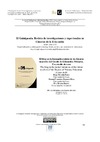Identificador persistente para citar o vincular este elemento:
https://accedacris.ulpgc.es/jspui/handle/10553/70292
| Campo DC | Valor | idioma |
|---|---|---|
| dc.contributor.author | Heredia Ponce, Hugo | en_US |
| dc.contributor.author | Romero Oliva, Manuel Francisco | en_US |
| dc.contributor.author | Álvarez Ramos, Eva | en_US |
| dc.date.accessioned | 2020-02-14T13:16:23Z | - |
| dc.date.available | 2020-02-14T13:16:23Z | - |
| dc.date.issued | 2019 | en_US |
| dc.identifier.issn | 2386-3374 | en_US |
| dc.identifier.uri | https://accedacris.ulpgc.es/handle/10553/70292 | - |
| dc.description.abstract | Este artículo se basa en un estudio de caso realizado con estudiantes del Grado en Educación Primaria de la Universidad de Cádiz y su objetivo es analizar las aportaciones del uso de un blog educativo en la formación inicial de profesorado. La investigación se compone de diversas fases y técnicas, que pretenden no solo delimitar su competencia digital, sino también darles voz en la adecuación de la incorporación y uso de blog, como protagonistas de su formación. La realización de un cuestionario TAM (Technology acceptance model) constituye un elemento de reflexión de los participantes que evidencia una gran aceptación y motivación hacia el uso de esta herramienta en el aula. Los resultados, sin poderse generalizar, se plantean desde el desarrollo de una matriz DAFO en la que se indican las dificultades, amenazas, fortalezas y oportunidades que se deben contemplar si se deseara replicar este tipo de actuaciones en otros contextos. | en_US |
| dc.description.abstract | This article is based on a case study carried out with students of the Degree in Primary Education of the University of Cádiz and its objective is to analyze the contributions of the use of an educational blog in the initial teacher training. The research consists of various phases and techniques, which aim not only to delimit their digital competence, but also to give them a voice in the adequacy of the incorporation and use of the blog, as protagonists of their training. The completion of a questionnaire TAM (Technology acceptance model) is an element of reflection of the participants that shows a great acceptance and motivation towards the use of this tool in the classroom. The results, without being able to generalize, arise from the development of a SWOT matrix in which are indicated the difficulties, threats, strengths and opportunities that should be contemplated if you want to replicate this type of actions in other contexts. | en_US |
| dc.language | spa | en_US |
| dc.relation.ispartof | El Guiniguada | en_US |
| dc.source | El Guiniguada [ISSN 0213-0610], v. 28, p. 93-109 | en_US |
| dc.subject | 58 Pedagogía | en_US |
| dc.subject | 531204 Educación | en_US |
| dc.subject.other | Blogs | en_US |
| dc.subject.other | Formación inicial de maestros | en_US |
| dc.subject.other | Edublogs | en_US |
| dc.subject.other | Estudio de caso | en_US |
| dc.subject.other | Educación Primaria | en_US |
| dc.subject.other | Initial teacher training | en_US |
| dc.subject.other | Case study | en_US |
| dc.subject.other | Primary Education | en_US |
| dc.title | El blog en la formación inicial de los futuros maestros del Grado de Educación primaria. Un estudio de caso | en_US |
| dc.title.alternative | The blog in the initial formation of the future teachers of the Degree of Primary Education. A case study | en_US |
| dc.type | info:eu-repo/semantics/article | en_US |
| dc.type | Article | en_US |
| dc.identifier.doi | 10.20420/ElGuiniguada.2019.268 | en_US |
| dc.investigacion | Artes y Humanidades | en_US |
| dc.type2 | Artículo | en_US |
| dc.identifier.ulpgc | Sí | es |
| dc.description.sellofecyt | Sello FECYT | |
| dc.description.esci | ESCI | |
| dc.description.dialnetimpact | 0,0 | |
| dc.description.dialnetq | Q3 | |
| dc.description.erihplus | ERIH PLUS | |
| item.grantfulltext | open | - |
| item.fulltext | Con texto completo | - |
| Colección: | Artículos | |
Visitas
119
actualizado el 10-ene-2026
Descargas
87
actualizado el 10-ene-2026
Google ScholarTM
Verifica
Altmetric
Comparte
Exporta metadatos
Los elementos en ULPGC accedaCRIS están protegidos por derechos de autor con todos los derechos reservados, a menos que se indique lo contrario.
